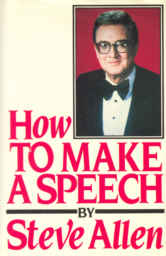In the first chapter Overcoming Stage Fright, Steve gives a lesson that I had to learn the
hard way. I was asked by Joseph Newman, the energy machine inventor, if I would give a speech
in support of his invention at the Hilton Hotel in downtown New Orleans. I scribbled a few notes
on a piece of paper and placed it in my pocket. The room was packed to overflowing with 2,000
people, and I was at the head table sitting next to Eddie Albert, the Hollywood movie star, who
spoke immediately before I did. I opened my speech with these words, "Most people ask how big Joe's energy machine can be built, but
I'd like to ask how small can it be built." I went on to describe a
world in which every electric appliance will be without wires if the machine can be made small
enough. It was a good speech, held the crowd's attention, and received warm applause. What
went on inside of me during the speech was difficulty breathing, tension, dry throat, my hands
trembled a bit, all the classic stage fright symptoms. This speech was videotaped, however, and I
have had numerous opportunities to view the tape, and what is astounding to me is that not a
single sign of all the mess that was going on inside of me was visible externally to the crowd.
Somehow that has freed me from ever experiencing stage fright again — why worry about
something happening if when it does happen, it has no discernable effect on your speech? Steve
makes a similar point and adds:
[page 8] You would have to turn pale, pass out, and fall into the orchestra pit
before anyone would remember the incident a week later.
In the chapter Writing the Speech Steve recommends an old book that is a favorite of
mine since I discovered it years ago titled How To Lie With Statistics. Its stated purpose is not to
teach you to be devious, Steve says.
[page 34] But the book will help clarify your own thinking about arithmetical
information and percentages and will, if interpreted properly, make you
more responsible in using them.
Steve recommends the use of outside authorities, but notes the pitfalls that accompany
them — especially if the quotations, even though cited with the originator's name, take the place
of expressing your own point clearly and concisely.
[page 37] Far better than dependence on outside authorities will be a well-reasoned argument that applies precisely to the question at issue. To
construct such an argument it will be necessary for you to think.
Should one memorize a speech? I suppose for actors the answer is obvious, but
sometimes one doesn't have the time to memorize a speech. Steve says even if you memorize it,
don't give it exactly as memorized. And if you don't have the time for memorization:
[page 53] Give particular attention to the opening and closing. If you make it
clear to your audience at the outset that you are communicating with them
directly, in a personal way, they will, perhaps, not notice when you later
begin to read from the text. If you finish in the same manner, with no
downward glances, that will leave the same impression.
Mortimer Adler makes a similar point in his book titled How To Speak, How To Listen.
He suggests that you know exactly how to open your speech, and do it with elan, looking your
audience directly in the eyes. And close the same way.
There are many more chapters in this book: Rehearsing the Speech, Getting Ready, The
Actual Performance, The Ad-Lib Speech, Should You Employ Humor?, Speaking in Unusual
Circumstances, Accepting an Award, Summing Up the Evening's Program, and Serving as
Toastmaster. Each one of them is chock full of thoughtful suggestions and appetizing tidbits to
enliven and enhance your speeches.
~^~
Any questions about this review, Contact: Bobby Matherne
~~~~~~~~~~~~~~~~~~~~~~~~~~~~~~~~~~~~~~~~~~~~~~~~~~~~~~~~~~

 == == == == == == == == == == == == == == == ==
== == == == == == == == == == == == == == == ==
22+ Million Good Readers have Liked Us
22,454,155
as of November 7, 2019
Mo-to-Date Daily Ave 5,528
Readers
For Monthly DIGESTWORLD Email Reminder:
Subscribe! You'll Like Us, Too!
== == == == == == == == == == == == == == == ==
Click Left Photo for List of All ARJ2 Reviews Click Right Bookcover for Next Review in List
Did you Enjoy this Webpage?
Subscribe to the Good Mountain Press Digest: Click Here!


CLICK ON FLAGS TO OPEN OUR FIRST-AID KIT.
All the tools you need for a simple Speed Trace IN ONE PLACE. Do you feel like you're swimming against a strong current in your life? Are you fearful? Are you seeing red? Very angry? Anxious? Feel down or upset by everyday occurrences? Plagued by chronic discomforts like migraine headaches? Have seasickness on cruises? Have butterflies when you get up to speak? Learn to use this simple 21st Century memory technique. Remove these unwanted physical body states, and even more, without surgery, drugs, or psychotherapy, and best of all: without charge to you.
Simply CLICK AND OPEN the
FIRST-AID KIT.

Counselor? Visit the Counselor's Corner for Suggestions on Incorporating Doyletics in Your Work.

All material on this webpage Copyright 2019 by Bobby Matherne




